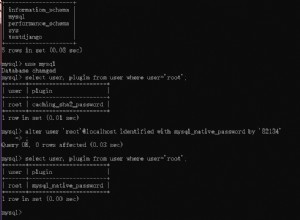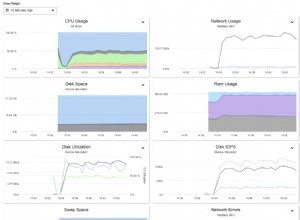Ogni volta che chiami un metodo statico sulla tua classe modello, restituisce una query Fluent come DB::table('yourmodeltable')->method . Se lo tieni a mente, ti renderai presto conto che è possibile fare qualsiasi domanda con i modelli Eloquent.
Ora, per ottenere prestazioni migliori, puoi utilizzare SQL DATA() funzione. Il mio esempio di seguito non è stato testato, quindi sentiti libero di correggerlo per favore.
// tomorrow -1 week returns tomorrow's 00:00:00 minus 7 days
// you may want to come up with your own date tho
$date = new DateTime('tomorrow -1 week');
// DATE(objecttime) turns it into a 'YYYY-MM-DD' string
// records are then grouped by that string
$days = Object::where('objecttime', '>', $date)
->group_by('date')
->order_by('date', 'DESC') // or ASC
->get(array(
DB::raw('DATE(`objecttime`) AS `date`'),
DB::raw('COUNT(*) as `count`')
));
foreach ($days as $day) {
print($day->date . ' - '. $day->count);
}
Questo dovrebbe stampare qualcosa come:
2013-03-09 - 13
2013-03-10 - 30
2013-03-11 - 93
2013-03-12 - 69
2013-03-13 - 131
2013-03-14 - 185
2013-03-15 - 69
Modifica:
L'approccio suggerito sopra restituisce istanze di Eloquent Model, che possono sembrare strane, specialmente se var_dump($days) . Puoi anche usare list() di Fluent metodo per ottenere la stessa cosa.
$date = new DateTime('tomorrow -1 week');
// lists() does not accept raw queries,
// so you have to specify the SELECT clause
$days = Object::select(array(
DB::raw('DATE(`objecttime`) as `date`'),
DB::raw('COUNT(*) as `count`')
))
->where('created_at', '>', $date)
->group_by('date')
->order_by('date', 'DESC') // or ASC
->lists('count', 'date');
// Notice lists returns an associative array with its second and
// optional param as the key, and the first param as the value
foreach ($days as $date => $count) {
print($date . ' - ' . $count);
}




